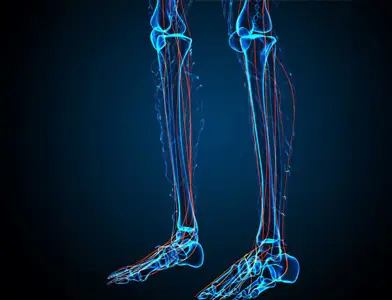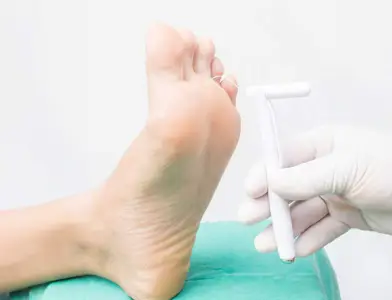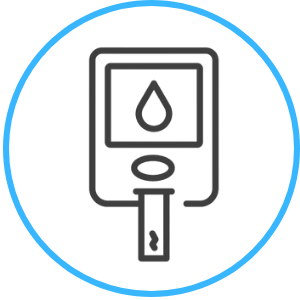Causes, Symptoms And Treatment Options For Understanding.
We help many patients conquer the high hurdles and obstacles of Sensory Neuropathy at Neuropathy Relief Miami! Guiding patients in a deeper understanding of what the condition is, why it occurs and how to treat it with some advanced treatments explains all about Sensory Neuropathy.

What is Sensory Neuropathy?
Sensory Neuropathy occurs when the peripheral nerves, responsible for transmitting sensory signals such as touch, temperature, and pain from the body to the brain, are damaged. This damage can lead to a range of symptoms, significantly impacting patients’ quality of life.
What is Typical for Sensory Neuropathy
Sensory Disruptions
- arasethesia (pins and needles): Often one of the first signs presenting as a prickly sensation.
- Numbness – A loss of sensation which can be in patches or affect the complete limb.
- Tingling pins and needles can be painful or irritating.
- Gradual numbness and tingling that proceeds from the feet to above your mouth or takes place in some cases only affects a hand/alternatively an arm.
- Temperature Loss of Sensation: This dangerous one that already exposes the patients to burn injuries, as they may not detect hot or cold surfaces.
- Recurrent Ache and Stabbing: Severe, sometimes sudden pain that can have immense effects on your quality of life.
- Triggered by contact- even a bedsheet brushing across the skin can be painful.

Difficulty in Coordinate with the Motor
- A person with balance and coordination problems may find it difficult to maintain stability, which can increase the chances of any fall.
- Clumsiness : Scant awareness of motor pathways to yield a desired ending, particularly comprehensive finesse and sensibility as well due to sensory impairment.
- Walking Difficulty: Caused by the numbness on feet, which is an inconvenience for walking.
- An overall Sign of Diabetic Nerve Damage, You cant Feel Vibration anymore: Loss to a critical sensory input that should let you know how successfully you are navigating Safe space is gone.
Sensory and Perception (DeepIssues)
- Inability to Sense Limb Position: Known as proprioception loss, this symptom can make it feel like one is disconnected from their own limbs.
- Unawareness of Injuries: Not noticing cuts or wounds on the feet or hands can lead to infections or more severe complications.
- Sensation of Wearing Gloves or Stockings: A peculiar symptom where individuals feel as though they are always wearing gloves or stockings, even when they are not.
The factors that contribute to sensory neuropathy
Lead to seriously reduced quality of life. Understanding the cause is critical for managing the condition effectively. At Neuropathy Relief Miami, they are to analyse the various factors behind this complex condition.
What are the main causes of sensory neuropathy? According to research, sensory neuropathy is caused by a variety of factors that can generally be divided into identifiable and idiopathic (unknown).

The Main Factors Behind Sensory Neuropathy
A third of cases of Sensory Neuropathy are diabetes-related. Over time uncontrolled blood sugar levels can lead to significant nerve damage and therefore a major way to stave off neuropathy is to keep your blood sugar level within a healthy range.

Physical Trauma and Accidents
Physical trauma could also play a role in Sensory Neuropathy, bringing us another third of the cases. Car accidents, falls, sports injuries and repeated stress are all sources of injury that can directly damage the nerves or interfere with their normal function, leading to the varied and often serious symptoms typical of neuropathic diseases.

Toxin-Induced
Exposure to certain toxins is also a well-documented cause of Sensory Neuropathy, with alcohol, chemotherapy drugs and industrial chemicals being particularly harmful. Over-use of alcohol is well-known as a cause of nerve damage, while chemotherapy, currently a mainstay in cancer treatment, all too often has effects on the nervous system.

Metabolic and Hormone Balance
The nerve function is vital for maintaining the appropriate level of sensation. This sensitivity also depends on neurotransmitters such as serotonin, norepinephrine and dopamine. The process in which many nerves transmit information to one another at synapses (nerve junctions located deep inside the brain) is carried out by electrical conduction through different molecules that extend beyond the gap between two individual neurons. Metabolic disorders and hormonal imbalances are just one example of how something as simple as a vitamin deficiency can cause problems with your nerves.

Hereditary Sensory Neuropathy
A small proportion of neuropathy sufferers inherited the disorder: for example, Charcot-Marie-Tooth disease is the commonest hereditary form. Finally, patients with these genetic illnesses require specialized management strategy and care on the part of their doctors.

Infectious Diseases
In addition to factors like metabolic disorders and physical trauma, infections also play a key role in causing Sensory Neuropathy. Diseases such as HIV/AIDS, hepatitis C, herpes, and Lyme disease can directly attack nerves or induce autoimmune responses, leading to neuropathy. This just goes to show how varied and complex are the origins of neuropathic disease.

Addressing the Causes of Sensory Neuropathy
Neuropathy Relief Miami is a place where our purpose is to figure out what’s behind Sensory Neuropathy symptoms and then we can render effective and targeted treatment. For overall efficacy in treatment, it is crucial to identify the root cause.
Seeking Solutions for Sensory Neuropathy?
Suffering with Sensory Neuropathy? Or perhaps worried about the risk factors? Our team at Neuropathy Relief Miami is here for you. With early intervention and proper management, quality of life really can be greatly improved.
Frequently Asked Questions (FAQs): Sensory Neuropathy
How Do Metabolic Disorders Lead to Sensory Neuropathy?
Metabolic disorders disrupt the body’s natural processes, potentially damaging nerves. For example, uncontrolled diabetes can cause high blood sugar levels that damage peripheral nerves, leading to neuropathy.
Can Nutritional Deficiencies Cause Sensory Neuropathy?
Yes, deficiencies in essential nutrients, especially B vitamins, are crucial for nerve health. Their absence can lead to nerve damage and neuropathic symptoms.
Are There Hereditary Factors Involved in Sensory Neuropathy?
es, some forms of Sensory Neuropathy are hereditary, caused by genetic conditions that affect nerve health, such as Charcot-Marie-Tooth disease.
Can Sensory Neuropathy Be Prevented?
While not all causes can be prevented, managing risk factors such as diabetes, avoiding excessive alcohol consumption, and treating nutritional deficiencies can help reduce the risk or slow the progression of neuropathy.